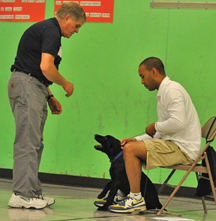Department of Justice clarifies definition of Service Animals
Harold Hansen helping a student at his "Heeling Free" Dog School in Eugene
Harold Hansen, owner and operator of “Heeling Free” Dog School in Eugene, contacted Spot recently to share an article he published recently in a human-focused medical publication. He felt — and we wholeheartedly agreed — that the information was important to share with all those who work, live with and love dogs. The article was originally created for physicians after Hansen received a call from a dog owner who said she wanted her doctor to write a letter saying she needed a “Service Dog.” She said her doctor wasn’t certain about the guidelines, so Hansen did the homework and learned that the definition had recently been clarified to read:
“Under the Americans with Disabilities Act (ADA), businesses and organizations that serve the public must allow people with disabilities to bring their service animals into all areas of the facility where customers are normally allowed to go.”
Hansen says that regulations covering emotional support animals for housing and airline access are different; links to those rules appear at the end of this article.
The U.S. Dept. of Justice revised the definition July 23, 2010 to say, “Service animal means any dog that is individually trained to do work or perform tasks for the benefit of an individual with a disability, including a physical, sensory, psychiatric, intellectual, or other mental disability.” The key points are that it must be a dog, and it must do something other than simply be a dog.
“Until now,” says Hansen, “a patient could have claimed, ‘I need one because I stay in my home all the time, and with a dog, I will have go out to buy him food and take him for walks.’ Others might claim their need was for company, companionship, or protection. The new definition clearly explains, ‘The crime deterrent effects of an animal’s presence and the provision of emotional support, well-being, comfort, or companionship do not constitute work or tasks for the purposes of this definition.’”
“At ‘Heeling Free’ Dog School, I get calls from people wanting a ‘Service Dog.’ Before the update, I would tell them that Lane County Animal Services issues a free ‘Service Dog’ license when a person presents a physician’s letter stating the need for a Service Dog, and proof that the dog has a current rabies immunization. There were no training or task requirements.”
Hansen went on to say that “People with untrained, even aggressive dogs would obtain a letter, get the license, and cause problems. When challenged about the dog’s behavior, the dog owner would claim protection under the ADA. While the law still prohibits asking ‘about the nature or extent of a person’s disability,’ now, the dog owner may be asked ‘if the animal is required because of a disability and what work or task the animal has been trained to perform.’”
In Lane County, as rabies immunizations expire, current Service Dog licenses must also be renewed. Holders will be required to present evidence that the dog performs a task. Physicians who have written letters for Service Dogs may be approached by patients again. Hansen says the new definition will allow physicians to quickly determine whether a patient’s needs fall within the new standard.
Laws for airline travel, housing, and public accommodations are different. Information about all three are available on the homepage of Hansen’s website, Heelingfree.com, or call Hansen directly at 541-484-6680.
Harold Hansen opened “Heeling Free” Dog School in Eugene in 1976, offering classes for family dog owners. Along with the basics, help is offered with behavior problems including separation anxiety and serious aggression. In 2000 his book, The Dog Trainer’s Guide to Parenting was published by Sourcebooks. Hansen teaches classes in Eugene and Corvallis. He lives with his retired 15-year-old Shiba, Zippy, and a gray and white stray cat that is adopting him.

